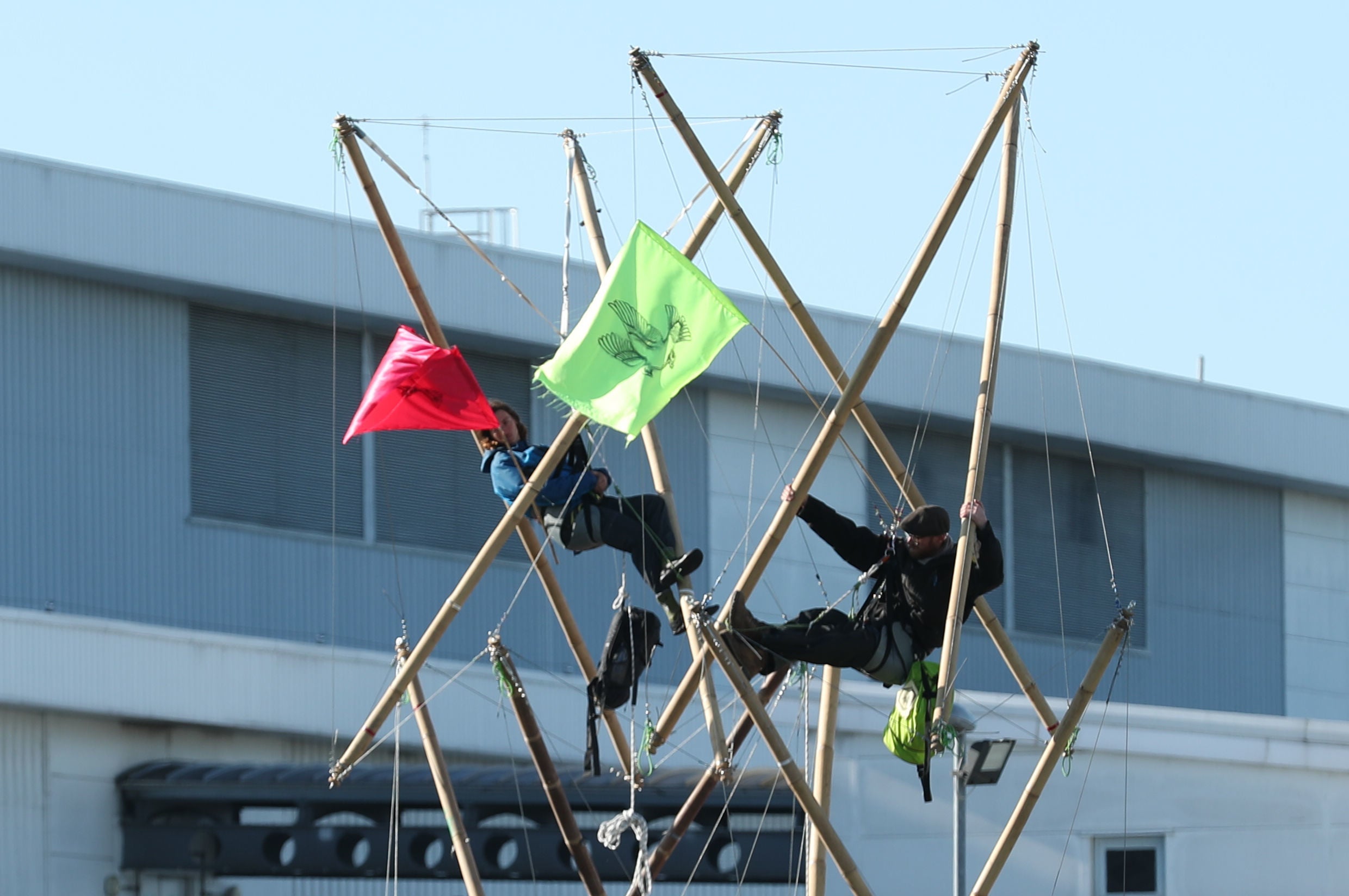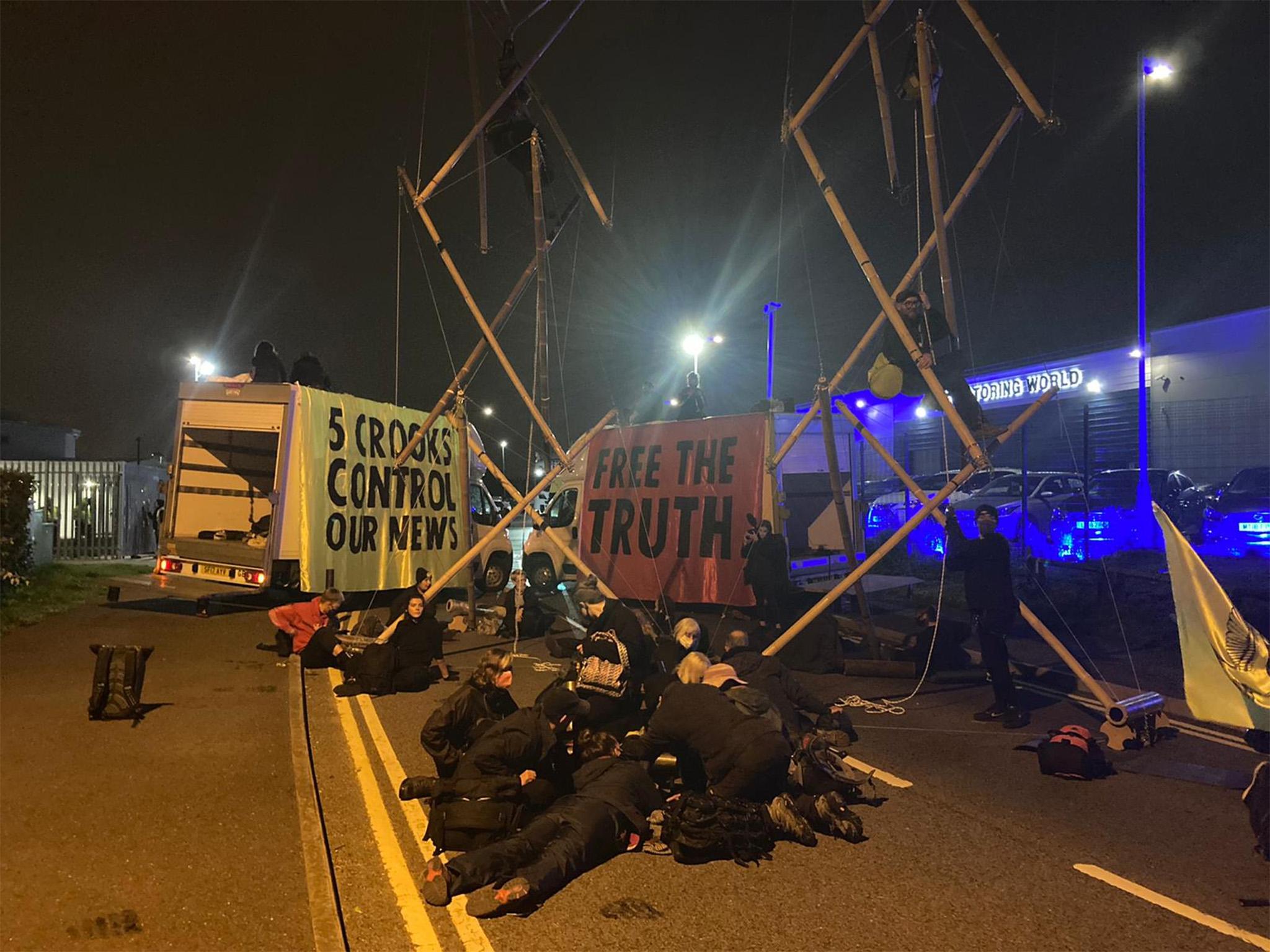Priti Patel ‘wanted early intervention’ in Extinction Rebellion printworks protest, court hears
Senior officer who commanded police response says he was not influenced by home secretary
Priti Patel told police she wanted an “early intervention” into the Extinction Rebellion protest outside a Rupert Murdoch-owned printworks, a court has heard.
The officer who commanded the operation said his decisions were not affected by calls and texts the home secretary made to his colleagues.
Owen Weatherill, the assistant chief constable of Hertfordshire Police, told St Albans Magistrates’ Court that in the phone call first notifying him of the demonstration on 4 September, he was told that the prime minister and home secretary were “taking an interest”.
Minutes later, he received a call from chief constable Charlie Hall to discuss the response to the blockade.
Mr Weatherill said his superior told him he had been in contact with Ms Patel, and that she “had been seeking an early intervention” to remove protesters.
The court previously heard that the home secretary exchanged several calls and text messages with Mr Hall as the Broxbourne protest continued through the night.
Mr Hall attended the force’s headquarters in the early hours of the morning, as officers worked to remove activists who had locked themselves onto bamboo structures outside the plant where The Sun, The Times, the Daily Mail, the Daily Telegraph and London Evening Standard are printed.
An independent review of the operation, which was commissioned by Hertfordshire Police, highlighted the “volume of contact” between the home secretary and chief constable.
“Political contact from government ministers needs to be carefully considered in future to avoid decision-making falling outside our recognised command structures,” the report added.
When being questioned on Monday, Mr Weatherill said he believed the chief constable was present at headquarters overnight because of “government interest” in the Extinction Rebellion protest, and did not have any operational responsibilities.
Mr Weatherill denied being put under “political pressure” himself and said his decisions on how to respond to protesters were not affected.

“At no point was I put under pressure,” he told the court. “I would have been surprised if there wasn’t that kind of political interest because of the nature of the protest and where it was. I wouldn’t say it influenced my decisions.”
Mr Weatherill said the principle of operational independence from political interference in British policing was “strongly held” by officers.
Asked if he had been the victim of political “encroachment” into policing, the senior officer replied: “I don’t think I’ve been the victim of anything here … MPs, ministers and politicians taking an interest is not new. It did not change my decision-making.”
Mr Weatherill said the home secretary “takes an active interest in a number of issues in policing” and receives briefings from officers.
The hearing was told that Mr Weatherill was the public order gold commander for the protest and set “strategic objectives” for the officers below him.
They were to maintain traffic flow on the A10, which leads to the printworks access road blocked by protesters, to allow the printworks and a nearby hotel to continue work, and to “facilitate the protest if at all possible”.
Mr Weatherill said officers tried to encourage protesters to move out of the road and would have allowed the demonstration in a “suitable location”.

The court heard that at 4.45am, the chief constable called Mr Weatherill to ask if the removal of protesters could be “expedited … following a conversation he had with the home secretary shortly before”.
Mr Weatherill said he passed the request to officers on the ground and received a response saying it was not possible.
“I wasn’t instructed by the chief constable, I was asked a question by the chief constable,” he added. “Neither he nor the home secretary got the answer that they wanted.”
The court heard that records of contact with the home secretary were deleted from the chief constable’s phone because of an “automated factory reset”.
District Judge Sally Fudge has ruled that screenshots of messages from other sources will not be disclosed publicly or to the defence because they do not have the potential to undermine the prosecution case.
The evidence emerged during the trial of the second group of defendants who have been charged with obstructing a highway at the Broxbourne protest.
Caspar Hughes, 49, of Exeter, Elise Yarde, 32, of Walthamstow, Amir Jones, 39, of London, Laura Frandsen, 30, of London, Charlotte Kirin, 51, of Bury St Edmunds and Hazel Steson, 56, of Bury St Edmonds, deny all charges.
The first group of six demonstrators were convicted in May and two others pleaded guilty before trial.
The blockade was at the Newsprinters site in Broxbourne, Hertfordshire, owned by Rupert Murdoch's News UK.
It stopped three-and-half-million national newspapers from being distributed across the country.
A second blockade of the company’s printing works in Knowsley, near Liverpool, took place on the same day.
Protesters previously told St Albans Magistrates’ Court the action aimed to highlight the media’s failure to report the seriousness of climate change.
Ms Patel publicly condemned the demonstration at the time, calling it an “attack on our free press” and “completely unacceptable”, and dozens of activists have since been prosecuted.
The government is now backing a controversial suite of strengthened protest laws that are a direct response to Extinction Rebellion’s tactics.



